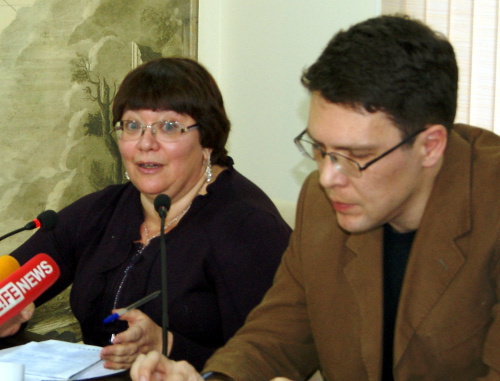
15 January 2014, 13:18
Authors of the report “The North Caucasus: Quo Vadis?”: With use of force, a social explosion is inevitable
The implementation of a policy of civil reconciliation would at first create a surge of violence, but this is the only way to lead the North Caucasus out of its crisis, say the authors of the report “The North Caucasus: quo vadis?” Irina Starodubrovskaya and Konstantin Kazenin. They noted that the recommendations of the report are primarily addressed to civil society, not to the authorities. Experts participating in a discussion of the report confirmed the prevalence of clannishness and a low level of state control in the North Caucasus.
As “Caucasian Knot” reported, on January 14, in Moscow the Committee for Civil Initiatives organized a presentation of the report “The North Caucasus: quo vadis?” by two colleagues of the Gaidar Institute for Economic Policy Irina Starodubrovskaya and Konstantin Kazenin, in which they propose a “scenario of civil reconciliation” to help the region exit the crisis, including a set of political and economic measures.
More than twenty experts participated in the event: economists, sociologists, and political scientists. In all more than fifty people attended the presentation, including journalists, religious figures, and representatives from the republics of the North Caucasus.
The report “The North Caucasus: quo vadis?” consists of six chapters, dedicated to the crisis of “modernization from above”, the land crisis, the crisis of policy in relation to the elite, the crisis of antiterrorist activities and religious policies, and also the image crisis of the North Caucasus. The authors see three possible scenarios in the development of the situation in the North Caucasus: inertial, violent, and a “scenario of civil reconciliation”, which the authors deem the most satisfactory.
North Caucasian society at a turning-point, say report’s authors
The crisis in the North Caucasus is clearly set forth in three points, but its main cause is an incorrect characterization of the region as stagnant, depressed, and archaic, said Irina Starodubrovskaya during her presentation.
“In those sectors where policy in relation to the North Caucasus Federal District (NCFD) is defined and publicly announced, it is implemented very inefficiently and with very high costs and expenses. And this generates serious negative externalities related to the exacerbation of the conflict. However, while if in the sphere of socioeconomic development policy is defined and it is possible to assess its effectiveness, in other important spheres – such as land relations and antiterrorism – policy is simply undefined, in any case it is not publicly discussed, and we cannot see a well-defined strategic line. This in my opinion is the second characteristic of the crisis. And, additionally, we are seeing a deepening image crisis for the North Caucasus”, stated Irina Starodubrovskaya.
The central cause of the crisis, in her opinion, is that the characterization (or “diagnosis”) of the North Caucasus as a stagnant, depressed, and archaic society is principally untrue. “The North Caucasus is a society at a turning-point, it is very dynamic and turbulent”, noted the expert.
Konstantin Kazenin spoke on the harm of “mythology” on policy. He criticized the established notion that the North Caucasian elite consists of clans, whose internal relations are based on archaic principles of ethnicity and kinship. In Kazenin’s opinion, for realistic policy ethnicity is no longer as much of a factor.
“Ethnic and kinship solidarity in the structure of the elite does play a role, but there’s actually nothing that radically distinguishes the Caucasus from other regions. These are classic patron-client relationships, where, say, an official at a high level formulates a team of officials at a lower level from loyal businessmen and guarantees them career mobility, safety for their business, and so forth. The majority of such alliances are in fact multiethnic”, stated Kazenin.
He also called the opinion that the Caucasian elite have a principally different structure in comparison with the elites of other Russian regions a myth. “A second myth which strongly influences policy is the notion that the current elite are the sole guarantee of a pro-Russian orientation in the region. As if soon as the current elite were gone, separatists would take their place. In reality this mentality is probably dictated by the memory of the 1990’s, when separatist sentiment was actually powerful. Now, in our opinion, it has been marginalized. For an average citizen a connection with Russia means a lot”, said the analyst.
Three scenarios of development
The presenters proposed three possible scenarios in the situation’s development. “The first scenario is inertial – the continuation of the status quo, undefined policy, and gradually fading attempts at modernization of the economy… The second scenario involves force – if the use of force increases, in the middle-term plan a social explosion is inevitable. And, finally, the third scenario is civil reconciliation, which is in our opinion the only option that will lead the situation out of crisis,” said Irina Starodubrovskaya.
The “scenario of civil reconciliation” includes six focuses. Economically, this means state support of viable projects, cooperation on modernization processes “from below” and an end to the moratorium on land transfers, said the expert.
Also, according to this scenario, authorities in the republics must be elected on the basis of direct elections; they must broadly develop processes for civil dialogue, and provide unconditional observation of constitutional rights and freedoms, including freedom of conscience. In addition, this scenario implies that on the federal level methodical processes for helping fighters adapt to a life of peace will be provided, while military actions will be put under civilian control. Also mentioned in this scenario are special measures for securing access to quality education, opening up of social mobility, and integration into Russian society for the region’s youth.
As Irina Starodubrovskaya noted, on every point of recommendation the reporters presented an idea of exactly which resources would be used to implement such policies.
“But to begin to implement this policy and at the same time to expect development to go forward without hindrance would be absolutely incorrect. The implementation of this policy would at first provoke an inevitable upsurge in violence that we need to be ready for – because this would be a violation of the interest structures already in place, a transformation of the economic and political environment into something much more competitive, which would obviously upset a lot of people, and in this case these are people with the potential for more than a little violence. We need to get through this crisis, and only then will we see the light at the end of the tunnel”, said Starodubrovskaya.
She also noted that “there would be no inquiry from the government itself… therefore we need to work within the framework of civil society”.
Experts discuss the prevalence of clannishness and low level of control in the North Caucasus
Ekaterina Sokiryanskaya, the head of the Russian office of the International Crisis Group, highly commended the part of the report which was dedicated to an analysis of the antiterrorist activity crisis.
“Ordinarily a discussion of this topic, which is crucial to understanding the conflicts of the North Caucasus, is the prerogative of human rights advocates. This report introduces an assessment of the war on terror into Russia’s expert mainstream, and this is very important. I absolutely agree with the authors of the report that there must finally be an expert evaluation of the implications of a brutal hard power scenario in the North Caucasus, its impact on the intensity of youth flight into the wilderness and the geographical spread of the conflict”, said Sokiryanskaya.
Another part of the report she considered critically important was the analysis of the elite crisis.
“In a common perception of the region, it is seen as an oriental setting and there is an understanding of the society as archaic, clannish, and tribal, and the authors of the report very clearly and distinctly show why this perception is inadequate and even dangerous. It is in fact built from a neo-colonial system of governance, the basis of which is the following interaction: on the one hand, the freedom of the elite to engage in shady economic activities, nepotism, clannishness; and on the other hand, loyalty to the federal center. This leads to a low level of state control in the North Caucasus”, stated Ekaterina Sokiryanskaya.
At the same time, she did not agree with Konstantin Kazenin’s opinion that ethnicity has ceased to be an important factor in the North Caucasus. “Many conflicts, the source, the roots of which are related to economic, land, and political contradictions, very quickly acquire an ethnic dimension, which then changes the character of the conflicts and they become harder to regulate and irrational”, said Sokiryanskaya.
Suleiman Uladiev, the co-chair of the societal organization “Dagestan – A Land of Peace and Harmony”, did not agree with the point of view the authors held about clans and their role in the deepening of the crisis.
“The problem of clan organization among the authorities and society in Dagestan has not yet been resolved. To solve these problems, which are correctly identified in the report, is impossible. It’s a fact – the crisis won’t go away. It must be tackled. The question is who should do it. Why is there nothing in the report about who should concern themselves with these problems and prevent their reoccurrence? The main problem is the regional authority and federal policy in relation to the Northern Caucasus. The people are excluded from the formulation of government. The scheme, where the president of Russia presents the head of the republic to the National Assembly, is ineffective”, said Suleiman Uladiev.
Natalya Zubarevich, a doctor of geographical sciences and the director of the regional program of the Independent Institute of Social Policy, thanked the authors of the report for an honest appraisal of the situation.
“Currently in Russia there is such a deficit of honest assessments, not to mention professional ones, that for just one we must say thank you. The second thing that is important to note is that the problem this report addresses is incredibly long-term”, stated the expert.
In her words, the results of the modernization transition would not be seen for three, five, ten and even fifteen years.
“This is a problem for two generations, around forty years at the least, and colleagues have finally stated this clearly. What they’ve done with the Chechnya of Kadyrov is an intermediate, temporary solution, which will undoubtedly crumble—because modernization transitions don’t happen quickly. My third point is that this is a transition in a very sick country, resembling the Russian empire of 1916, and in a sick country there are no easy transitions. Whatever we start to do, even if done painstakingly, will start out by getting worse. This is an absolutely unavoidable attribute of any change and transformation. At first it always gets worse, and you just have to see it through this period. And that period can be measured in years, not months”, stated Natalya Zubarovich, sharing her opinion.
The article translated by Matthew McDonald.
Author: Aida Magomedova Source: CK correspondent




